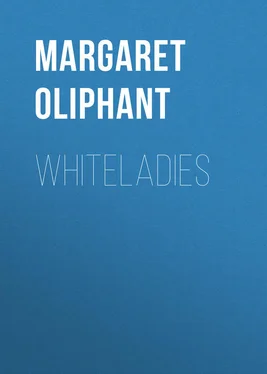Margaret Oliphant - Whiteladies
Здесь есть возможность читать онлайн «Margaret Oliphant - Whiteladies» — ознакомительный отрывок электронной книги совершенно бесплатно, а после прочтения отрывка купить полную версию. В некоторых случаях можно слушать аудио, скачать через торрент в формате fb2 и присутствует краткое содержание. ISBN: , Жанр: foreign_prose, на английском языке. Описание произведения, (предисловие) а так же отзывы посетителей доступны на портале библиотеки ЛибКат.
- Название:Whiteladies
- Автор:
- Жанр:
- Год:неизвестен
- ISBN:http://www.gutenberg.org/ebooks/52388
- Рейтинг книги:5 / 5. Голосов: 1
-
Избранное:Добавить в избранное
- Отзывы:
-
Ваша оценка:
- 100
- 1
- 2
- 3
- 4
- 5
Whiteladies: краткое содержание, описание и аннотация
Предлагаем к чтению аннотацию, описание, краткое содержание или предисловие (зависит от того, что написал сам автор книги «Whiteladies»). Если вы не нашли необходимую информацию о книге — напишите в комментариях, мы постараемся отыскать её.
Whiteladies — читать онлайн ознакомительный отрывок
Ниже представлен текст книги, разбитый по страницам. Система сохранения места последней прочитанной страницы, позволяет с удобством читать онлайн бесплатно книгу «Whiteladies», без необходимости каждый раз заново искать на чём Вы остановились. Поставьте закладку, и сможете в любой момент перейти на страницу, на которой закончили чтение.
Интервал:
Закладка:
Margaret Oliphant
Whiteladies
CHAPTER I
It was an old manor-house, not a deserted convent, as you might suppose by the name. The conventual buildings from which no doubt the place had taken its name, had dropped away, bit by bit, leaving nothing but one wall of the chapel, now closely veiled and mantled with ivy, behind the orchard, about a quarter of a mile from the house. The lands were Church lands, but the house was a lay house, of an older date than the family who had inhabited it from Henry VIII.’s time, when the priory was destroyed, and its possessions transferred to the manor. No one could tell very clearly how this transfer was made, or how the family of Austins came into being. Before that period no trace of them was to be found. They sprang up all at once, not rising gradually into power, but appearing full-blown as proprietors of the manor, and possessors of all the confiscated lands. There was a tradition in the family of some wild, tragical union of an emancipated nun with a secularized friar – a kind of repetition of Luther and his Catherine, but with results less comfortable than those which followed the marriage of those German souls. With the English convertites the issue was not happy, as the story goes. Their broken vows haunted them; their possessions, which were not theirs, but the Church’s, lay heavy on their consciences; and they died early, leaving descendants with whose history a thread of perpetual misfortune was woven. The family history ran in a succession of long minorities, the line of inheritance gliding from one branch to the other, the direct thread breaking constantly. To die young, and leave orphan children behind; or to die younger still, letting the line drop and fall back upon cadets of the house, was the usual fate of the Austins of Whiteladies – unfortunate people who bore the traces of their original sin in their very name.
Miss Susan Austin was, at the moment when this story begins, seated in the porch of the manor, on a blazing day of July, when every scrap of shade was grateful and pleasant, and when the deep coolness of the old-fashioned porch was a kind of paradise. It was a very fine old house, half brick, half timber; the eaves of the high gables carved into oaken lace-work; the lattice casements shining out of velvet clothing of ivy; and the great projecting window of the old hall, stepping out upon the velvet lawn, all glass from roof to ground, with only one richly-carved strip of panelling to frame it into the peaked roof. The door stood wide open, showing a long passage floored with red bricks, one wall of which was all casement, the other broken by carved and comely oaken doors, three or four centuries old. The porch was a little wider than the passage, and had a mullioned window in it, by the side of the great front opening, all clustered over with climbing roses. Looking out from the red-floored passage, the eye went past Miss Susan in the porch, to the sweet, luxuriant greenness of the lime-trees on the farther side of the lawn, which ended the prospect. The lawn was velvet green; the trees were silken soft, and laden with blossoms; the roses fluttered in at the open porch window, and crept about the door. Every beam in the long passage, every door, the continuous line of casement, the many turns by which this corridor led, meandering, with wealth of cool and airy space, toward the house, were all centuries old, bearing the stamp of distant generations upon the carved wood and endless windings; but without, everything was young and sunny, – grass and daisies and lime-blossoms, bees humming, birds twittering, the roses waving up and down in the soft wind. I wish the figure of Miss Susan had belonged to this part of the landscape; but, alas! historical accuracy forbids romancing. She was the virtual mistress of the house, in absence of a better; but she was not young, nor had she been so for many a long day.
Miss Susan was about sixty, a comely woman of her age, with the fair hair and blue eyes of the Austins. Her hair was so light that it did not turn gray; and her eyes, though there were wrinkles round them, still preserved a certain innocence and candor of aspect which, ill-natured people said, had helped Miss Susan to make many a hard bargain, so guileless was their aspect. She was dressed in a gray gown of woollen stuff (alpaca, I think, for it is best to be particular); her hair was still abundant, and she had no cap on it, nor any covering. In her day the adoption of a cap had meant the acceptation of old age, and Miss Susan had no intention of accepting that necessity a moment before she was obliged to do so. The sun, which had begun to turn westward, had been blazing into the drawing-room, which looked that way, and Miss Susan had been driven out of her own chair and her own corner by it – an unwarrantable piece of presumption. She had been obliged to fly before it, and she had taken refuge in the porch, which faced to the north, and where shelter was to be found. She had her knitting in her hands; but if her countenance gave any clue to her mind’s occupation, something more important than knitting occupied her thoughts. She sat on the bench which stood on the deepest side between the inner and the outer entrance, knitting silently, the air breathing soft about her, the roses rustling. For a long time she did not once raise her head. The gardener was plodding about his work outside, now and then crossing the lawn with heavy, leisurely foot, muffled by the velvet of the old immemorial turf. Within there would now and then come an indistinct sound of voice or movement through the long passage; but nothing was visible, except the still gray figure in the shade of the deep porch.
By-and-by, however, this silence was broken. First came a maid, carrying a basket, who was young and rosy, and lighted up the old passage with a gleam of lightness and youthful color.
“Where are you going, Jane?” said Miss Susan.
“To the almshouse, please,” said Jane, passing out with a curtsey.
After her came another woman, at ten minutes’ interval, older and staider, in trim bonnet and shawl, with a large carpet-bag.
“Where are you going, Martha?” said the lady again.
“Please, ma’am, to the almshouse,” said Martha.
Miss Susan shrugged her shoulders slightly, but said no more.
A few minutes of silence passed, and then a heavy foot, slow and solemn, which seemed to come in procession from a vast distance, echoing over miles of passage, advanced gradually, with a protestation in every footfall. It was the butler, Stevens, a portly personage, with a countenance somewhat flushed with care and discontent.
“Where are you going, Stevens?” said Miss Susan.
“I’m going where I don’t want to go, mum,” said Stevens, “and where I don’t hold with; and if I might make so bold as to say so, where you ought to put a stop to, if so be as you don’t want to be ruinated and done for – you and Miss Augustine, and all the house.”
“ ‘Ruinated’ is a capital word,” said Miss Susan, blandly, “very forcible and expressive; but, Stevens, I don’t think we’ll come to that yet awhile.”
“Going on like this is as good a way as any,” grumbled the man, “encouraging an idle set of good-for-nothings to eat up ladies as takes that turn. I’ve seen it afore, Miss Austin. You gets imposed upon, right hand and left hand; and as for doing good! – No, no, this ain’t the way.”
Stevens, too had a basket to carry, and the afternoon was hot and the sun blazing. Between the manor and the almshouses there lay a long stretch of hot road, without any shade to speak of. He had reason, perhaps, to grumble over his unwilling share in these liberal charities. Miss Susan shrugged her shoulders again, this time with a low laugh at the butler’s perturbation, and went on with her knitting.
Читать дальшеИнтервал:
Закладка:
Похожие книги на «Whiteladies»
Представляем Вашему вниманию похожие книги на «Whiteladies» списком для выбора. Мы отобрали схожую по названию и смыслу литературу в надежде предоставить читателям больше вариантов отыскать новые, интересные, ещё непрочитанные произведения.
Обсуждение, отзывы о книге «Whiteladies» и просто собственные мнения читателей. Оставьте ваши комментарии, напишите, что Вы думаете о произведении, его смысле или главных героях. Укажите что конкретно понравилось, а что нет, и почему Вы так считаете.












